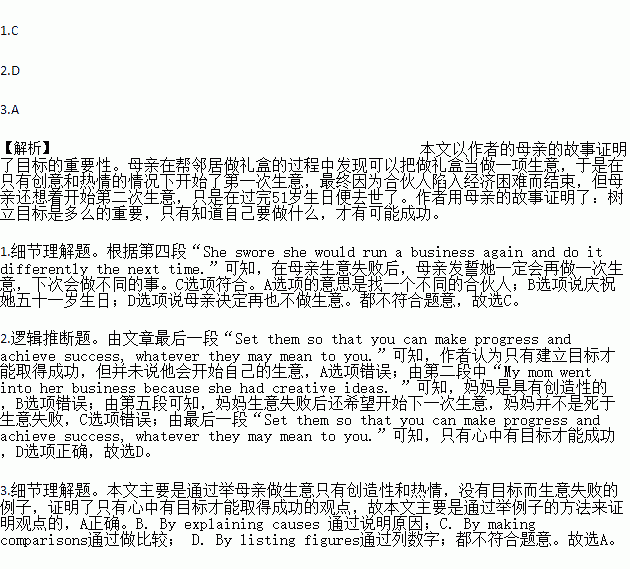题目内容
In the early 1980s, one of our neighbors asked my mom if she would make a few gift baskets for her to give as gifts for the holidays. My mom agreed and news of the unique gift baskets my mom was making spread like wildfire throughout the neighborhood. My mom was busy throughout the holiday season, so she asked a friend to help her. When the orders continued after the holiday season for baby gifts, birthday gifts and more, it occurred to them that maybe this job could be turned into a business and they did it.
My mom went into her business because she had creative ideas. She got orders and filled order. But there was no goal and no real plan. In 1991, my mom’s partner got into financial trouble and there was not enough money to support either mom or her partner.
So if you are led by your creativity or enthusiasm, make sure you ask yourself what you purpose to do your business is. If you don’t set goals, how will you know which direction to go in? Do you want to create jobs and growth in the economy? Are you looking for a hobby? You can’t keep scores if you don’t know what game you are playing.
After my mom’s partner quit, she had to abandon her business to support herself. She swore she would run a business again and do it differently the next time. However, there wasn’t a “next time” for her. She passed away just after her 51st birthday. She never had someone tell her how important having a goal was, she never had a chance to be everything she could be.
There are no right or wrong goals, only the ones that matter to you. Set them so that you can make progress and achieve success, whatever they may mean to you.
1.What did the writer’s mom do after failing in her business?
A. She found a different partner.
B. She celebrated her 51st birthday.
C. She planned to have a second try with different methods.
D. She decided never to run a business again.
2.What can we infer from the passage?
A. The writer began her business with a set goal.
B. The writer mother was a woman without creativity.
C. The writer’s mother died because of her failure in business.
D. The writer believes having goals in mind ensured one’s success.
3.How does the writer present his point of view mainly?
A. By providing examples. B. By explaining causes.
C. By making comparisons. D. By listing figures.

